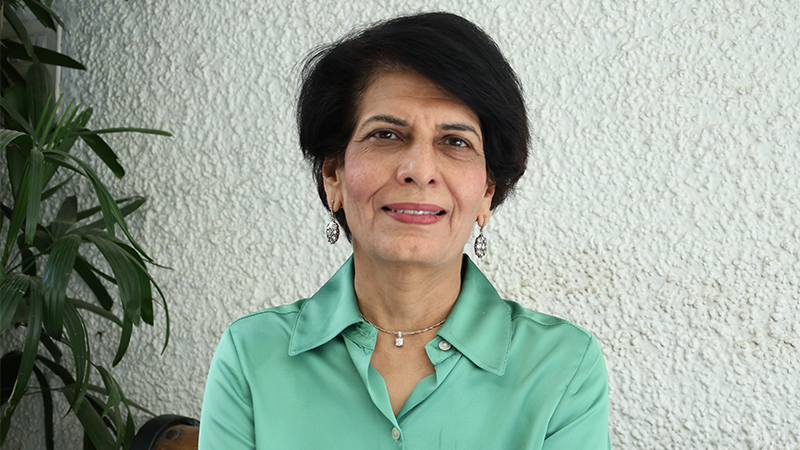She started the journey into nutrition almost 30 years ago, when this space was not as overcrowded as it is today. Yet, Ishi Khosla is a name to reckon with. She founded Whole Foods in 2001, hoping to give healthy alternatives to a largely obese Indian population, stuck on unhealthy snacking.
While a student of nutrition at Lady Irwin College, New Delhi, she struggled with breakout skin and obesity, which she decided to “transform through food”. Vitamin A cleared her skin, and the right nutrition helped. She also lost weight, leading her on a path of self-discovery, even while growing up in a house where food was favoured. “I realised the ingredients we normally use needed to be changed. It all began when I worked with acclaimed cardiologist Dr. Naresh Trehan at Escorts Heart Institute,” says Khosla.
She discovered that the Escorts canteen served foods that were not really good for the heart. She embarked on the “good fats, eggs, almonds journey”, telling them to avoid sweeteners at the hospital even for the family members and caretakers of patients.

Khosla and her husband launched Whole Foods, where she offered no preservative, non-processed food. A burger not made of white flour and taste enhancers could still be enjoyed with veggies and whole grain, changing its profile into something completely-heart friendly. “It induces no acidity; you never feel as if you overate,” she smiles, adding she told patients not to eat vanaspati, margarine, and bakery products. She substituted sugar with jaggery (khand) and dry fruits, and white bread with quinoa flour. “What was available 20 years ago was really nothing, and if it was healthy, it was steeply priced,” she says.
About the one-minute meals (noodles) the fast-paced student life or corporate world have been forced to adapt to, Khosla says, “It uses highly addictive substances. I got to know this after I read Dr. Robert Lustig’s ‘The Hacking of the American Mind’. I’ve had patients lose 35 kg just by adhering to diet-reversed metabolic syndrome.”
We are guided by taste; some fast foods stimulate the opioid centers of the brain, which is risky in the long run, she confirms. “What is light oil? A new gimmick in the market — just because it is light in color, doesn’t mean it’s healthy. It’s an attempt to woo vulnerable buyers,” she says. This leads to gut level inflammation, triggered by the food enhancers used in cooking, harming good bacteria.

Rather she suggests smart kitchens — insta pots, smoothie makers, soup makers, fully electric, slow cookers, and nutri-bullets to preserve nutrients. You can switch it on and get ready; your meal will be slow cooked. “Pleasure is in the mind. I see so many apps which deliver food at home — many patients have told me it gives more pleasure just ordering than eating,” says Khosla.
“Though I am not an advocate of vegetarianism, as this doesn’t translate to good health — fish is good for your skin and hair, but a veggie diet can provide all the nutrition like a non-veg one,” she affirms.
Her latest foray is with Weight Monitor, an app designed by her team, to offer her patients advice, which is personality driven. It prescribes a diet that is suited to the body composition, an end-to-end solution, customized, but through a devised algorithm.
“I see so many cases of poor mental health. I would say food is medicine. Breakdowns in kids are rampant; sometimes it is related to the gut, late-night snacking, and not getting enough sleep. Gut is the second brain — more signals go from gut to brain than vice-versa,” she says.
Khosla gives me an example of how her mother used to feed birds biscuits in her garden. She advised her to try bird feed (jowar, bajra). “They did not touch it, but instead wanted biscuits as their brain was used to the taste.That is how the human brain also works,” says Khosla.

She adds: “Depression, food intolerance, mood swings, high cholesterol, water retention, hot flashes can be handled with grain science, which supports and boosts digestion.”
This whole world of calorie counting, protein shakes, intermittent fasting is passe — if you see data, earlier almost 20 years ago, autism was 1 in 10,000 babies; now it’s 1 in 49 babies, and is no longer rare. “Almost 35% of children in India are stunted, reflecting on their diets. I see a sense of helplessness with young moms. If we do not make the right choices, we will suffer more,” she says.
While referring to various diet plans that people follow, Khosla says life is not about shortcuts. A sustainable solution to how we eat is a must. “Diet must be anti-inflammatory,” she concludes. – Asmita is the Lifestyle Editor of NRI Focus. She is an award winning journalist who has been writing on fashion for the last 32 years


Leave a Reply